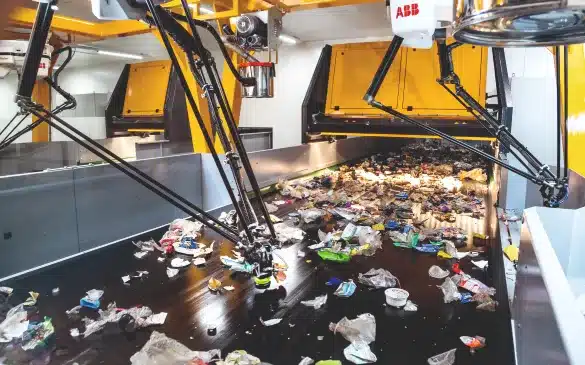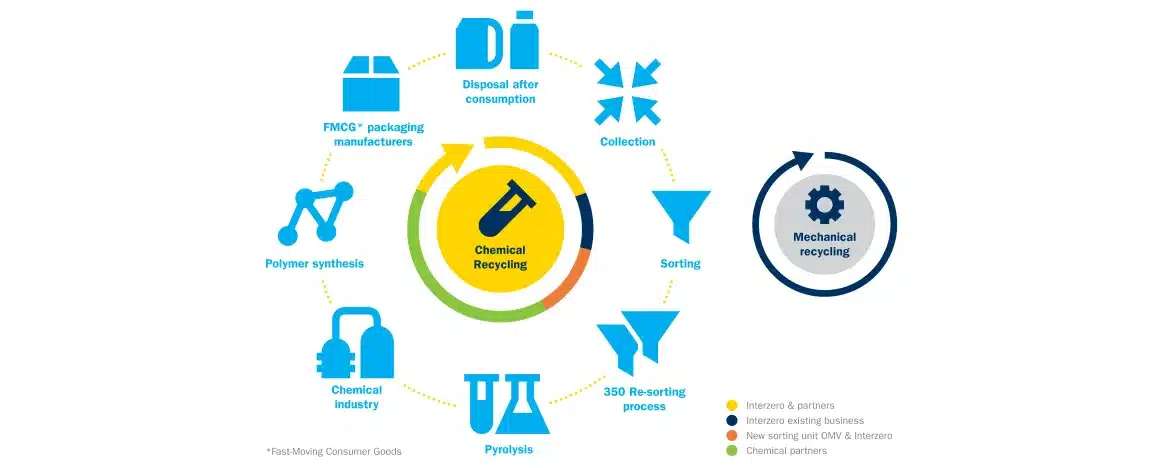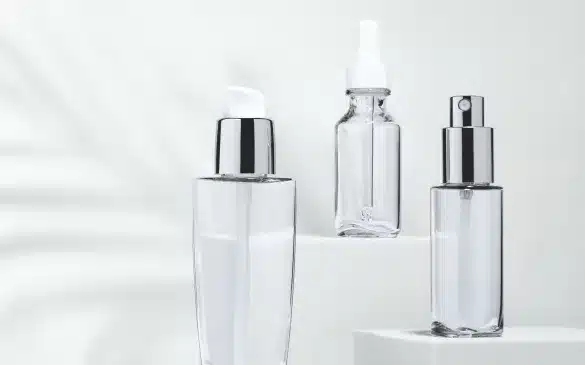Chemical recycling: The best for the rest
The perfect complement to mechanical recycling: Our sorting facility in Walldürn will enable large-scale chemical recycling of mixed plastics. Raw materials are protected from burning and processed into high-quality products.

Currently, the only option for mixed plastic waste that cannot be mechanically recycled is usually incineration. To keep these raw materials in circulation, recycling companies, the petrochemical industry and plastics manufacturers are working together to expand chemical recycling. This has potential: "Chemical recycling can handle material flows that cannot be recycled mechanically - and thus save resources and avoid waste incineration," says Dr. Markus Hiebel, head of sustainability and participation at the Fraunhofer Institute for Energy. environment, safety and energy technology UMSICHT.
Focus on mixed plastics
Each year, Interzero processes over 800,000 tons of lightweight yellow bag and yellow bin packaging. About half of them are mechanically recycled and used, for example, to produce regranulates for the plastics industry. One fourth is waste after sorting, including "inappropriate waste" that should not go into the yellow bin. The remaining 25 percent are mixed plastics that cannot be clearly assigned to sorting fractions and were previously thermally recycled. Interzero has developed a new sorting process specifically for this mix of materials. "While our previous sorting systems were targeted at monomaterials such as PE and PP, we are using new technology to generate plastic streams that are precisely tailored to our partners' chemical recycling processes," explains Dr. Richard von Goetze, director of... chemical recycling at Interzero.

Production start in Walldürn planned for 2026.
In November 2023 in Walldürn in Baden-Württemberg, construction works began on the creation of the largest sorting plant in Europe for the production of raw materials for chemical recycling -. a joint venture of Interzero and OMV . Thanks to this project, partners are creating approximately 120 new jobs - and new prospects for the circular economy. Once production starts in 2026 the plant will process up to 260,000 tonnes of mixed waste plastics per year. "We assume that we will be able to recover such large quantities for chemical recycling," says Dr. Richard von Goetze. "This will enable our partner companies to produce new food-grade plastics."
New plastics from non-recyclable plastic waste
Take OMV for example: the company will process mixed plastics from its shared sorting facility in Walldürn at its ReOil® plant, where these mixed plastics are broken down back into their basic components using pyrolysis. The pilot plant can process 100 kilograms of used plastics into 100 litres of pyrolysis oil per hour. Another plant with a capacity of 16,000 tonnes per year is currently under construction at the OMV plant in Schwechat (Lower Austria). The next step is the development of the ReOil® plant on an industrial scale with a planned capacity of up to 200,000 tonnes per year. The recovered raw materials will be used to produce plastics for a wide range of applications. These plastics will be ISCC PLUS (International Sustainability & Carbon Certification) certified, which ensures traceability throughout the supply chain and guarantees that the value chain meets all environmental and social standards.

Sustainable cooperation with Eastman
Different process, same goal: together with the American company Eastman, Interzero opens a new path for recycling difficult-to-recycle PET packaging. The company's future molecular recycling facility in France should be able to process more than 200,000 tons of PET waste per year. "Interzero and Eastman are committed to reducing plastic waste and building circularity," says Reinier de Graaf, director of raw materials strategy at Eastman. "We are pleased to be working closely with Interzero to source some of the raw materials needed for our plant." Eastman's polyester processing technology breaks down mixed PET waste into monomers and then recombines them into a high-quality material.
Due to the efficiency of the integrated plant and the renewable energy sources available in France, the plant is expected to operate with significantly lower greenhouse gas emissions than conventional petroleum-based processes. The concept is also well received by brand manufacturers - Eastman already produces on a large scale in the US and sells its recycled materials around the world: Eastman recycled plastics are processed into reusable bottles, home appliances, consumer electronics and packaging, among others. cosmetics. The French project also receives strong support from global brands, primarily LVMH Beauty, The Estée Lauder Companies, Clarins, Procter & Gamble, L'Oreal and Danone, which have signed letters of intent for multi-year supply agreements.
Next steps
Working together to close the loop and safeguard valuable raw materials: The industry is providing new technologies and opportunities, but the further expansion of chemical recycling will also depend on political framework conditions - for example recognition in the Packaging Act. Dr. Axel Schweitzer, president and shareholder of Interzero, said at the groundbreaking ceremony for the new plant in Walldürn: "I am convinced that thanks to chemical recycling, the recycling rate in Germany can and will increase significantly in the future. This will bring us a big step closer to our vision of a world without waste."
